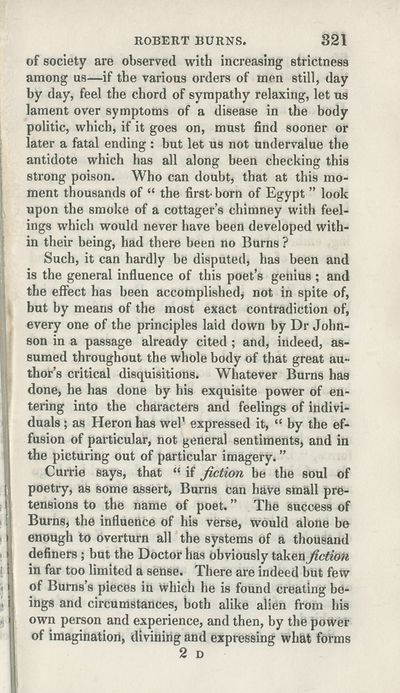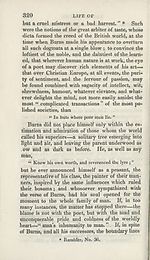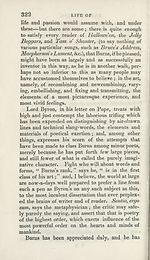Scotland/Scots > Life of Robert Burns
(331)
Download files
Complete book:
Individual page:
Thumbnail gallery: Grid view | List view

ROBERT BURNS. 821
of society are observed with increasing strictness
among us—if the various orders of men still, day
by day, feel the chord of sympathy relaxing, let us
lament over symptoms of a disease in the body
politic, which, if it goes on, must find sooner or
later a fatal ending : but let us not undervalue the
antidote which has all along been checking this
strong poison. Who can doubt, that at this mo¬
ment thousands of “ the first- born of Egypt ” look
upon the smoke of a cottager’s chimney with feel¬
ings which would never have been developed with¬
in their being, had there been no Burns ?
Such, it can hardly be disputed, has been and
is the general influence of this poet’s genius ; and
the effect has been accomplished, not in spite of,
but by means of the most exact contradiction of,
every one of the principles laid down by Dr John¬
son in a passage already cited ; and, indeed, as¬
sumed throughout the whole body of that great au¬
thor’s critical disquisitions. Whatever Burns has
done, he has done by his exquisite power of en¬
tering into the characters and feelings of indivi¬
duals ; as Heron has wel' expressed it, “ by the ef-
I fusion of particular, not general sentiments, and in
the picturing out of particular imagery. ”
Currie says, that “ if fiction be the soul of
| poetry, as some assert, Burns can have small pre-
l tensions to the name of poet. ” The success of
Burns, the influence of his verse, would alone be
i enough to overturn all the systems of a thousand
definers ; but the Doctor has obviously taken/fcftora
in far too limited a sense. There are indeed but few
of Burns’s pieces in which he is found creating be¬
ings and circumstances, both alike alien from his
own person and experience, and then, by the power
of imagination, divining and expressing what forms
2 D
of society are observed with increasing strictness
among us—if the various orders of men still, day
by day, feel the chord of sympathy relaxing, let us
lament over symptoms of a disease in the body
politic, which, if it goes on, must find sooner or
later a fatal ending : but let us not undervalue the
antidote which has all along been checking this
strong poison. Who can doubt, that at this mo¬
ment thousands of “ the first- born of Egypt ” look
upon the smoke of a cottager’s chimney with feel¬
ings which would never have been developed with¬
in their being, had there been no Burns ?
Such, it can hardly be disputed, has been and
is the general influence of this poet’s genius ; and
the effect has been accomplished, not in spite of,
but by means of the most exact contradiction of,
every one of the principles laid down by Dr John¬
son in a passage already cited ; and, indeed, as¬
sumed throughout the whole body of that great au¬
thor’s critical disquisitions. Whatever Burns has
done, he has done by his exquisite power of en¬
tering into the characters and feelings of indivi¬
duals ; as Heron has wel' expressed it, “ by the ef-
I fusion of particular, not general sentiments, and in
the picturing out of particular imagery. ”
Currie says, that “ if fiction be the soul of
| poetry, as some assert, Burns can have small pre-
l tensions to the name of poet. ” The success of
Burns, the influence of his verse, would alone be
i enough to overturn all the systems of a thousand
definers ; but the Doctor has obviously taken/fcftora
in far too limited a sense. There are indeed but few
of Burns’s pieces in which he is found creating be¬
ings and circumstances, both alike alien from his
own person and experience, and then, by the power
of imagination, divining and expressing what forms
2 D
Set display mode to:
![]() Universal Viewer |
Universal Viewer | ![]() Mirador |
Large image | Transcription
Mirador |
Large image | Transcription
| Antiquarian books of Scotland > Scotland/Scots > Life of Robert Burns > (331) |
|---|
| Permanent URL | https://digital.nls.uk/108249831 |
|---|
| Description | Thousands of printed books from the Antiquarian Books of Scotland collection which dates from 1641 to the 1980s. The collection consists of 14,800 books which were published in Scotland or have a Scottish connection, e.g. through the author, printer or owner. Subjects covered include sport, education, diseases, adventure, occupations, Jacobites, politics and religion. Among the 29 languages represented are English, Gaelic, Italian, French, Russian and Swedish. |
|---|

